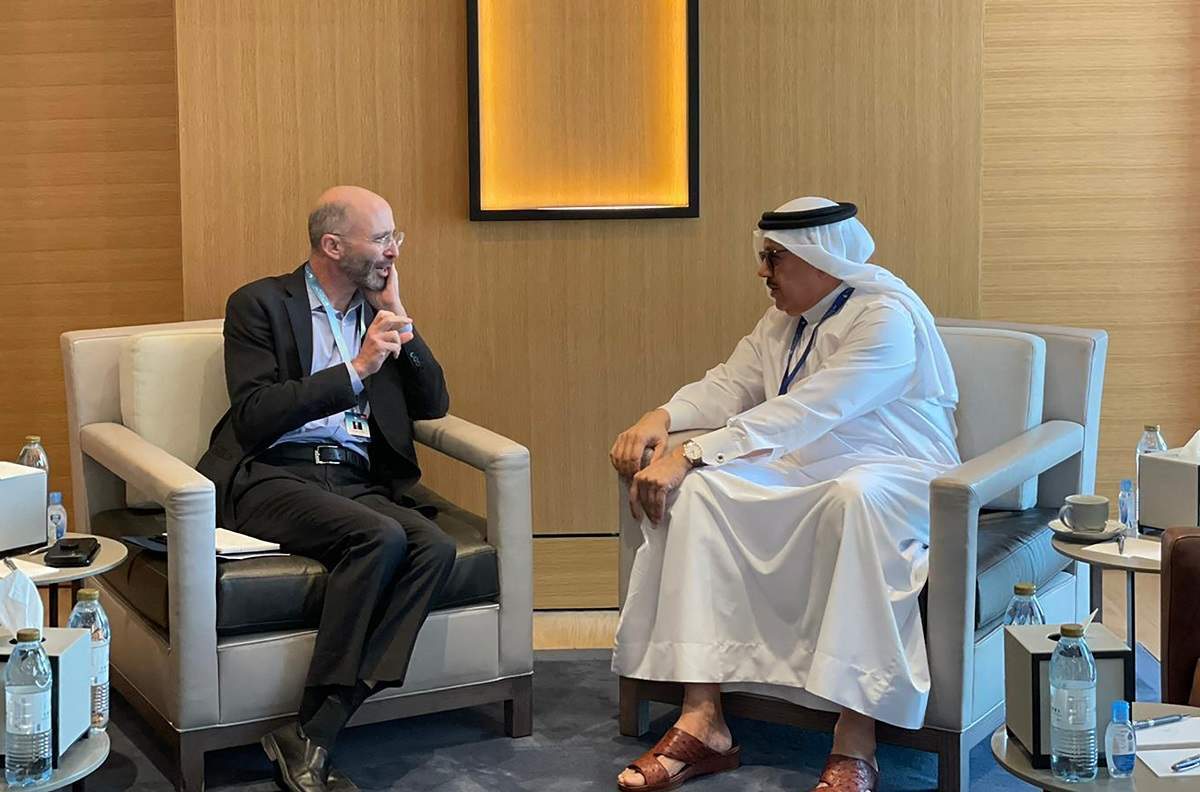Robert Malley, the US special envoy for Iran, may well be on a wild goose chase as he tours the region, for the second time in few weeks, seeking to consult with regional allies on the prospects of bringing Iran, as well as the US, back into the 2015 nuclear agreement of which he was a lead negotiator and architect.
اضافة اعلان
 US Special Envoy for Iran Robert Malley (left) meeting with Bahrain's Foreign Minister Abdullatif Al-Zayani in Dubai, the UAE, on November 13, 2021. (Photo: Bahrain News Agency/AFP)
US Special Envoy for Iran Robert Malley (left) meeting with Bahrain's Foreign Minister Abdullatif Al-Zayani in Dubai, the UAE, on November 13, 2021. (Photo: Bahrain News Agency/AFP)
After months of dithering, a new Iranian negotiating team — formed after Ibrahim Raisi, a hardliner, became the Islamic republic’s president — has set a date to resume talks in Vienna. On November 29, the interlocutors will meet again to restart negotiations but there is little hope that the gap that separates the two sides, mainly the US and its European allies and Iran with Russia and China backing it, can be closed.
But there is another dimension to the so-far clogged talks: Israel. Just like his predecessor, Benyamin Netanyahu, Israel’s Prime Minister Naftali Bennett is against the Iran nuclear deal — officially known as the Joint Comprehensive Plan of Action (JCPOA) — altogether and any understandings with Tehran. In fact, he has refused to meet with Malley, who saw Defense Minister Benny Gantz, Foreign Minister Yair Lapid, and top security officials. Lapid reportedly told the US envoy that Tehran was not interested in rejoining the agreement and that it was only trying to buy time.
Ironically, Malley may hear the same words from other US regional allies. The reality is that Tehran’s credibility is close to zero. It has problems with all its neighbors. Its proxies are disrupting all attempts to settle regional conflicts; from Yemen to Iraq and from Lebanon to Syria. In fact it is not only its unchecked nuclear activities that are worrying its neighbors, but also its long range missile program and its drone attack system that was used to target Saudi airports and oil facilities as well as the recent attempt on the life of Iraqi Premier Mustafa Al-Kadhimi.
Iran’s hardline stance has been emboldened by the belief in Tehran, and the rest of the region, that the US is slowly abandoning the Middle East. The so-called pivot to Asia mantra under President Barack Obama has reached its climax with the recent and chaotic US withdrawal from Afghanistan. The US’ allies — and foes — have read this withdrawal as a sign that Washington is no longer a reliable ally and that countries in the region must now chart their own foreign policy line in a way that protects their immediate interests.
Israel and a number of Gulf countries saw their national security interests aligned. Iran with its nefarious regional agenda is now a common threat to all. Restoring the JCPOA may not be the goal that would safeguard the long-term national interests of the region. Malley will have a tough time arguing to the contrary. Between the time Donald Trump withdrew from the agreement in 2018 and today Tehran had breached most articles in the JCPOA. It is now boasting to have produced 210kg of uranium enriched to 20 percent and produced 25kg at 60 percent, a level that no country apart from those with nuclear arms are able to produce.
The burning question is as follows: If Tehran continues to claim that its nuclear program is peaceful, why would it breach red lines to reach enrichment levels that would make it capable of producing weapon grade uranium stockpile?
The original JCPOA, which a number of countries want to expand and amend, was a good interim agreement despite Netanyahu’s whining. And Trump made a big mistake by unilaterally walking away from that agreement without consulting his allies.
But now we find ourselves at this vague juncture where Iran insists on a complete unconditional removal of all US sanctions while the Biden administration hopes to expand the deal; anathema to Iran’s hardliners.
Malley’s challenge is a complex one. On the face of it, it is the restoration of the deal at any cost. But in reality, little can be achieved when the issue is part of a larger one; that is Iran’s regional agenda and its proxies. Restoring the deal should lead to a wider relief and opening over other issues: The war in Yemen, Iran’s involvement in Iraq, Syria, and Lebanon. But that is easier said than done. For Malley, the conflict resolution expert, the task is humongous.
The US has talked about other options but that too is risky when Washington hopes to limit its involvement in the region’s conflicts. A military option is a dire and an unpredictable one for the US.
Tehran leaders must get the message that they have a choice to make: Either be accepted by the region as a normal state that is willing to respect its neighbors or face the fact that it will be treated as a pariah state for many years. The second option will only make the lives of millions of Iranians more difficult. Its nuclear ambitions will be challenged eventually and the price that will be paid will be hefty indeed.
Osama Al-Sharif is a journalist and political commentator based in Amman.
Read more Opinion and Analysis



